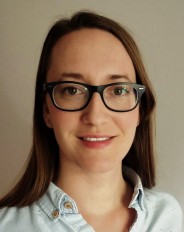Julia Wiktor

Julia Wiktor started her undergraduate work in applied physics at the Gdańsk University of Technology before winning a French Government scholarship to study at the Grenoble Institute of Technology. This exchange allowed her to earn two master’s degrees, one from her home university in Poland and the other, in nuclear materials, from Grenoble INP. After finishing the master’s degree in France, she continued to study nuclear materials, moving to CEA Cadarache, where she began working in computational material science. After finishing her PhD, she wanted to continue working on materials for energy applications, but with a focus on solar energy. This led her to EPFL, “which is well-known for solar applications.” After a three-year post-doc with Prof. Alfredo Pasquarello at the Chair of Atomic Scale Simulation, she moved to Chalmers University of Technology in Gothenburg, Sweden, where she has been working as an assistant professor since May this year.
What is your general field of study?
Mainly, I use advanced electron structure methods to study materials for solar energy applications. I want to understand how complex physical phenomena affect the efficiency of solar devices. In particular, I currently focus on metal-halide perovskites for new solar cells and also complex metal oxides for water-splitting devices. I am very interested in solar energy devices and so I am continuing this line of research that I started at EPFL.
How did your experience at MARVEL help you progress in your career?
I think that in general I benefited a lot from the post-doc at EPFL and within MARVEL. First of all, more locally, I learned many techniques when working with Prof. Alfredo Pasquarello. Alfredo is very knowledgeable about a wide range of computational techniques and I learned so much from him. I was able to work with completely different techniques in each project and I think that now this has enabled me to study a broad range of topics. Getting to know all of these technical details helped me a lot.
More generally, I think it was important that MARVEL gave me the opportunity, through meetings and seminars, to develop a broad idea of all the different topics that people in the field are really interested in. It gave me a chance to be involved at the forefront of the research. In most cases, MARVEL projects reflect what people care about more internationally and so it really helped me be aware of what’s going on in the field of materials. I think that keeping up with current trends in materials science is extremely important for a young researchers looking to pursue a career in science, especially when writing research proposals for independent positions. I also think that EPFL and MARVEL have a certain prestige that also surely helped when my application was reviewed—I’m sure that people knew about EPFL and MARVEL.
What did you most appreciate about MARVEL?
All the MARVEL meetings and seminars and dinners and retreats were very helpful, and also quite fun! In general, I think the community aspects—being brought together with all the other post-docs and PhD students working on different materials but still quite similar topics and being able to spend time together talking about them—is a really strong point of MARVEL.
